My mobile phone buzzed with an email alert, jolting me out of my reverie. It was from Vicki Foster.
“As I am writing this, I am looking out of my window across the bay to 2,000-meter mountains rising to snowy peaks. There is a male elephant seal trumpeting his arrival to the beach with his massive nose.”
Interviewing Vicki was like sitting down in from of a TV and flipping the channel to National Geographic Network. She shared her story with so much enthusiasm that I could practically feel the excitement and energy pouring out of her, even she was almost 13,333 km away at the very bottom on the other side of the world – South Georgia Island, the last inhabited land before Antarctica.
“After living here for a while, you learn not to normalize that morning view. You would take a moment to appreciate what a special place this is.”
“Living in a place where wildlife significantly outnumbers humans has always been a blessing for me. The everyday experience of opening your blinds in the morning is one of the most surreal things. You never know if you’ll be looking out over a sea of elephant seals, belching and farting, a group of king penguins waddling along the beach or a blanket of pristine white snow with the black silhouette of a lone fur seal on it.”
South Georgia drew her like a beacon
Vicki graduated in Marine Biology and Marine Management. She has always been interested in fisheries management and the sustainable use of ocean resources. She was drawn to South Georgia for its excellent governance and science-led approach to fisheries management, which has resulted in the main fishery for Patagonian Toothfish being certified sustainable by MSC.
“The fish species here are fascinating rare and unique. For instance, Mackerel Icefish has no hemoglobin in its blood, a very unusual adaptation to living in the cold, oxygen-rich waters of the Southern Ocean. The absence of hemoglobin means it has transparent blood and snow-white heart.”
Variety is the spice of life
As a Government Officer, her role is immensely varied and gratifying. The daily tasks are very seasonal; austral summer (October to April) is the tourist season, with cruise ships and yachts visiting the island, while winter (May to September) is the fishing season. Being the Government’s sole representative on the island, Vicki is required to wear several hats, from police officer, coroner’s assistant to registrar.
“During the fishing season, we spend a great deal of time doing at-sea inspection of the fishing boats on a fishery patrol vessel, Pharos SG. We ride in a RHIB that is launched from the side of the patrol vessel to access the fishing boat in the middle of the Southern Ocean. Once alongside, we wait until we are at the top of a swell to catch hold of the ladder and climb onto the boat – it can be quite exciting! While onboard, the welcoming crew will hand us a cup of tea to warm up after the chilly RHIB ride.”
In summer, she carries out customs clearance and briefing works on cruise ships, ensuring visitors are informed about biosecurity and have the best experience possible on the island while keeping the wildlife safe.
In between these two big annual tasks, her days are filled with everything from overseeing wildlife film crews, to running the Post Office, stamping philatelic mail for the avid collectors worldwide, as well as doing the general admin to keep the territory running.
Biosecurity is a top priority on the island
The number of visitors to South Georgia is growing rapidly. In the summer of 2018-2019, South Georgia received a total of 77 cruise ships and 10 yachts, transporting over 10,000 visitors to the island.
Biosecurity is paramount in protecting the island. All visitors will go through a stringent inspection to ensure they do not have anything that might pose a threat to the island – insects, seeds and even soil. Thankfully, the vessels visiting South Georgia care as much about protecting the island. The crew are very vigilant in trying to meet the exacting standards and regulations.
An otherworldly destination beyond your wildest dreams and imagination
South Georgia is brimming with stunning landscapes and untouched wildlife. It is difficult for Vicki to narrow down her top picks.“Grytviken, the whaling station just across the bay from our station, is one of my highlights. It is the first thing you see as you sail into King Edward Point cove. To me, it signals my return to this southern paradise.”
“It is place with a remarkable history. Although many of the old buildings were removed due to asbestos risk, the remaining skeletons tell the untold tales of the past – the ruthless exploitation and destruction of the natural world, including the over-harvesting of whales that occurred here.”
“The old barracks, where remnants of the pin-up girl posters are still visible on the walls along with old leather shoes lost to their owners sitting on the floor, chronicle the comradeship of men working in the whaling industry – a comradeship that still exists among the people working here today.”
“Only an hour walk from the station is Penguin River. It is off the tourist trail but a firm favorite among locals. You can leisurely sit on a grassy riverbank, watching fur seal pups learning to swim in the safety of the eddies in the bends of the river. They are joined by a comparatively small group of 50 king penguins moulting their feathers on a shingle bank.”
“Fur seal pups are innately curious. If you sit still long enough, a small herd of them will cautiously approach you, inquisitively sniffing around your boots before growling and charging back into the river.”
For sheer mass of life, nothing can beat St. Andrews Bay. The bay is overwhelmingly inundated with over 150K pairs of breeding king penguins. They create quite a racket as they call to each other. In October, they are joined by 4-ton male elephant seals, who slam their bodies together in brutal fights to claim mating rights with the females, while the fat little pups watch on with their massive round eyes. Fur seals join the shore side melee, growling at anyone who gets too close.
Interspersed in this profusion of life, the scavenging birds – snowy sheathbills, giant petrels and skuas – pick over the remains of the chicks and pups that failed to survive.
Mind blowing wildlife and natural wonder to behold
Living in South Georgia means she gets to marvel at the wildlife spectacle in pretty much every part of the island from time to time. She remembers there were two occasions that truly took her breath away.
“One day, the team working on our small boats at the jetty put out a radio call informing us there was a big female leopard seal in the water nearby. Everyone on the station rushed down to get photos. After a while, the crowd began to disperse except me standing on the boat, just a little above the water level. The seal inched over to investigate the boat, and I started waving to get her attention.”
“The leopard seal was very inquisitive. She kept spy hopping – raising most of the top of her body out of the water to see what I was doing. We spent at least 20 minutes in each other’s company. While leopard seals are ferocious predators, with the boat’s railings safely keeping us apart, I did not feel threatened by her at all. It was a powerful experience that I felt we were both equally interested in each other.”
“On a beautiful clear winter day, I headed out with my friends Bob and Thies to climb Hodges, the mountain behind Grytviken whaling station. Snow and slick ice made the climb more treacherous than it already was. We trudged up the steep incline carefully. At the peak, we were rewarded with the most spectacular view. The clouds hung so low in the valleys that we had climbed above them into glorious sunshine. This effect, known as a cloud inversion, means that the valleys are covered in a fluffy white blanket of cloud, with just the highest mountain peaks poking through into the sun. It was a beautiful day with great company.”
- Thies and Vicki above station – Photo by Bob Pratt
- Cloud inversion by Thies Matzen
The rule of thumb – stay 5 meters away from the seals
While South Georgia does not have land-based predators, the seals can pose a threat to people. Fur seals have sharp teeth and can move insanely fast despite its large body. The males are very territorial, and will chase any interloper out of their space, be it seal or human!
Having said that, they can also be relatively calm if one steers clear of their territory and away from their harem of females. Elephant seals can also move surprisingly quickly over land and have strong jaws. While they usually retreat from humans, they have been known to chase people from a long way away.
“Despite the possible danger from wildlife, we don’t carry weapons. The best precaution is to stay alert to your surroundings, watching where the seals are and how they are behaving. When taking photos or conducting a field research, it is always advisable to work in teams, so at least one person can keep a look out. As a rule, we follow the same protocols as required for tourists – trying to keep at least 5 meters from the seals. During the peak breeding season, when the beaches are full, we avoid them. As a last resort, we carry a walking stick that can be held out to stop the charging animal from approaching further, buying us time to move away safely.”
On 18 May 2018, South Georgia was declared free from rats and mice
Rats have been stowaways on vessels visiting South Georgia since its discovery in 1775. There are no land-based predators on South Georgia. The island is devoid of trees and all the bird nests are built on the ground or in burrows, making them susceptible to be predated by hungry rats.
The South Georgia Pipit, the world’s most southerly songbird, along with small petrel species and the South Georgia pintail, a little duck, were the worst affected. These birds were virtually annihilated, only surviving in the small rat-free areas. Between 2013 and 2015, in what was the world’s largest ever operation of this kind, a GBP£10-million rat eradication project was undertaken.
“I was fortunate enough to be on the island in 2017-18, when an intensive search found no trace of rats on South Georgia. It is clear now that the bird’s population has bounced back. Pipit song, which was a rare treat when I first arrived at King Edward Point, has now become ubiquitous. As spring arrives, the chatter of pipits is all around as they fly high above the tussock, claiming their nesting territory for the breading season.”
“It is every visitor’s responsibility to make sure rodents do not repopulate the island. We work with visiting vessels to ensure they are rodent-free before entering our waters. All cargos go through rigorous biosecurity checks to ensure the continued survival of our iconic birds. Every fortnight, we check rodent traps around the station to make sure we do not have any unwanted visitors.”
South Sandwich Islands remain an undisturbed refuge for wildlife
The South Sandwich Islands are a group of volcanic islets, which lie 470 miles (760 km) to the southeast of South Georgia. Between 1976 and 1982, an Argentinian military encampment occupied the Southern Thule group of islands. But since 1982, no one has resided on the islands.
There are high levels of tectonic activity in the area. The volcanic island of Zavodovski erupted in 2016.
“On 12th August this year, we experienced the biggest earthquake in the region in the last 92 years – at 8.1M on the Richter scale. The magnitude was so large that it triggered a tsunami warning at King Edward Point. Everyone on the station put on enough warm clothes and headed up a nearby hill in gale force winds and snow. Thankfully, it turned out that the tsunami only had an amplitude of 1.5 meters, and the warning was downgraded to no threat soon after.”
The tectonic activity compounded with the remote location and bleak nature rendered the islands unsuitable for inhabitation and development. Periodically, camera crews brave the uncharted wilderness and land on the rocky shores to film the million pairs of nesting chinstrap penguins. Other than that, the islands are an undisturbed sanctuary for wildlife.
It is a place for adventurers at heart
People who live down here tend to be those who enjoy adventure and nature. With no bars, restaurants or cinemas, the outdoors is the main entertainment.
“it’s important to learn to fend for yourself living in such a remote island. You make do with what is available to get every problem solved. Staying positive is imperative when you live and work in a small community. Having a supportive group of people can make all the difference in times of need.”
“Whether it’s just for a few weeks over the summer, a 6-month Government Officer rotation or the 14-month stay for the British Antarctic Survey team, we are far away from friends and family, and always miss out on many life events, from birthdays to weddings.”
“There are no shops on the island. If you forget something or lose a glove, it will take up to 6 weeks for your parcel to arrive by post. Fresh fruit and vegetables are only shipped to the island every 6 weeks or so. Because it is a long-haul shipment, there are only limited items that can be imported. So, it’s definitely something everyone would miss while they’re here.”
- Mid-winters day – Matthew Phillips
- Christmas – Jerry Gilham
A community that feels like home
Over the course of summer, there are many different teams working at King Edward Point – a British Antarctic Survey team who support station logistics; the Government Officers; A government building team; Visiting scientists and the South Georgia Heritage Trust team who runs the museum in the old whaling station at Grytviken.
“Despite the different walks of life and roles, everyone pulls together as one team. There are get-together meals on Saturdays – everyone comes together for dinner and share stories from the week. There are also fun events, including the South Georgia Half Marathon, a grueling run up over the scree slopes and across boggy flats, and the annual regatta, where everyone builds model boats to sail across Gull Lake.”
“We also do “Doc School” training together. Being 800 miles from the nearest hospital and with only one doctor on station, everyone must know more than basic first aid.”
“In winter, the whole island will dwindle to 10-12 people, with only the BAS and Government Officer teams staying on the island. We spend the quiet winter evenings playing board games or watching movies.”
Toothfish Day on September 4th is an official public holiday on South Georgia to mark the end of toothfish season.
“Not long ago, we celebrated Toothfish day with a lovely meal. The BAS scientist, Matt, cooked us a delicious meal of toothfish tacos!”
“The other important celebrations on the island are Christmas and Mid-Winter. Christmas falls in the middle of our summer, when there are a lot of people on station and everyone is busy with work. Usually, the wonderful build team put on a huge BBQ, and we all gather in the sunshine to celebrate. Often, while standing outside station, you’ll even see a fur seal pup being born as you enjoy your Christmas tipple!”
Mid-Winter is celebrated on 21st June, the shortest day of the year. It marks the start of the return of longer days and warmer weather.
“We get together for a formal 3-course meal, dressing in all our finery. Presents are exchanged, with each person having handcrafted a gift for one other station member. After dinner, everyone sits down to listen to the BBC World Service broadcast, which is recorded specially for the British Antarctic Survey personnel, during which short messages are relayed to all the team from their loved ones at home.”
“After 7 months away from home, it can be quite an emotional evening. Obviously, some silly games and a few pints at the bar will continue to liven up the evening.”
Be it summer or winter, the chatter and laughter that surround the station never cease. When combined with the braying sound of penguins and a loud barking from seals, it creates a melodious natural symphony dedicated to the harmonious integration between humans and wildlife in this remote part of the world.
All photographs credit: Vicki Foster (except otherwise cited)

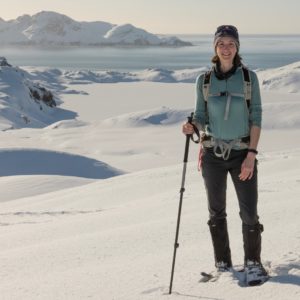

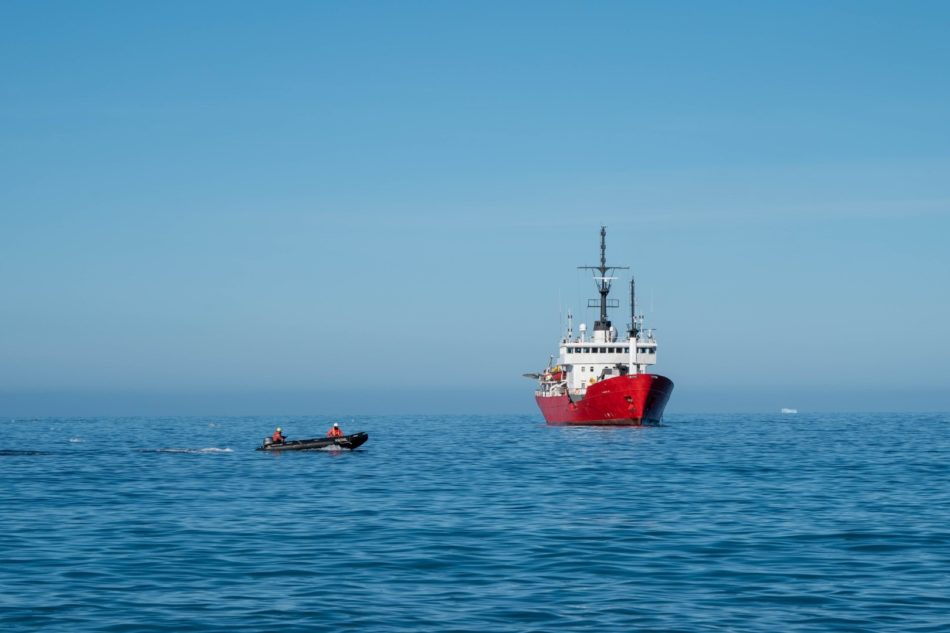


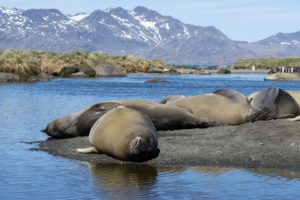
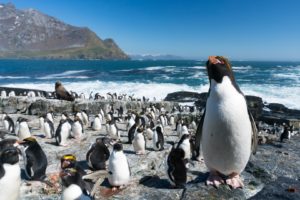

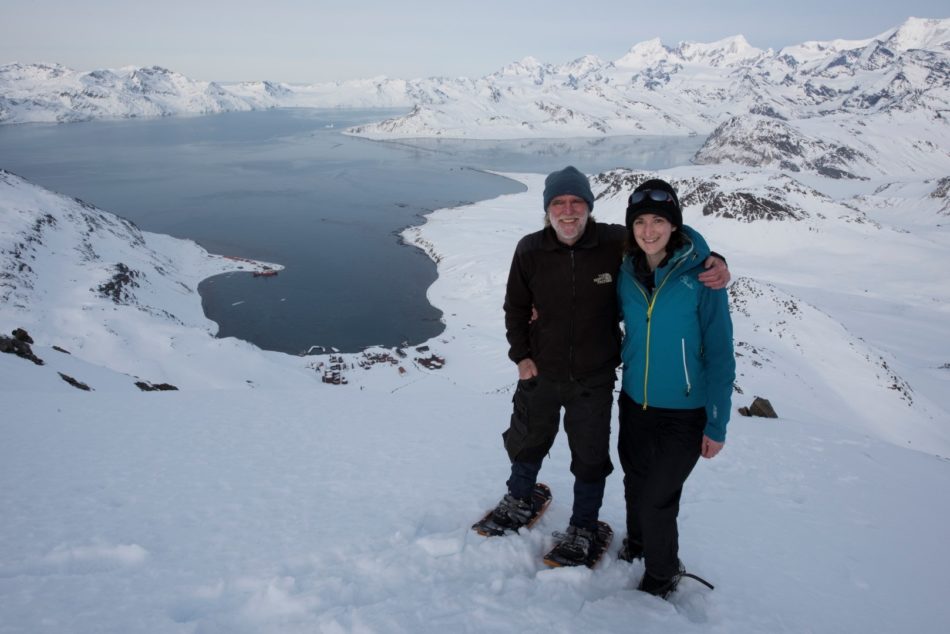
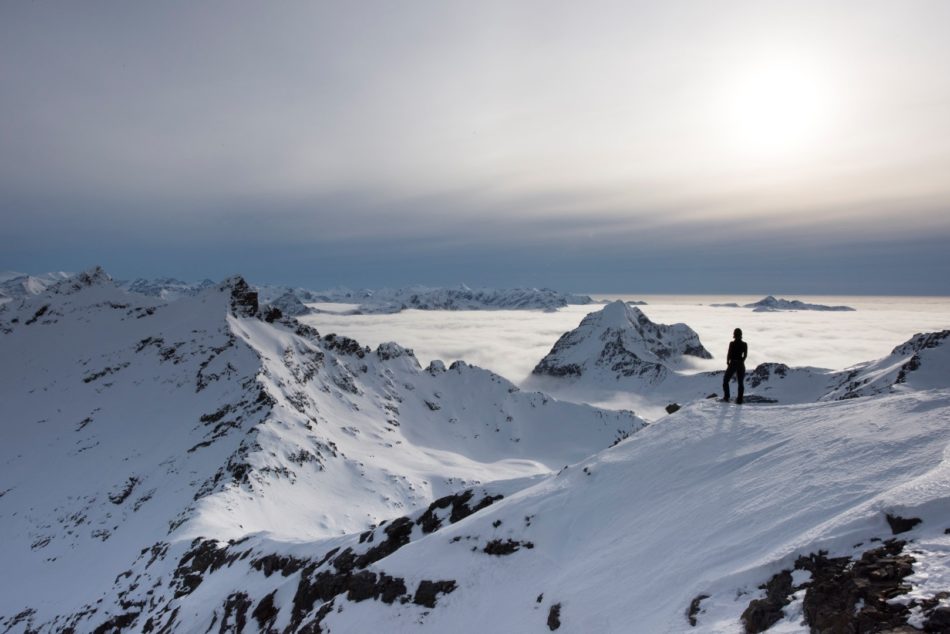
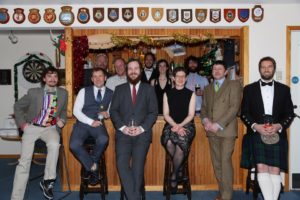

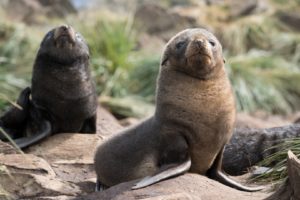
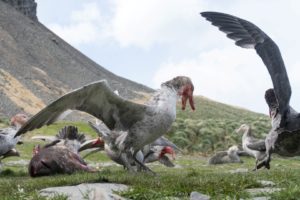
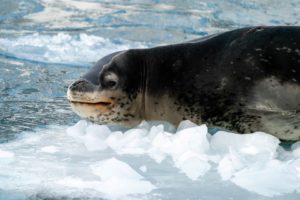
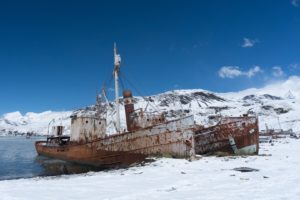
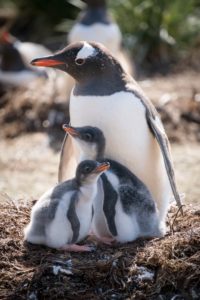


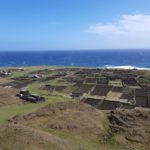
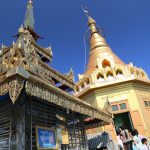
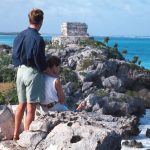
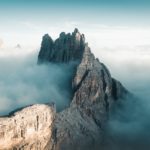

Woa, what a remote place and an interesting read. Great photos to!
I agreed, I enjoyed interviewing her too!